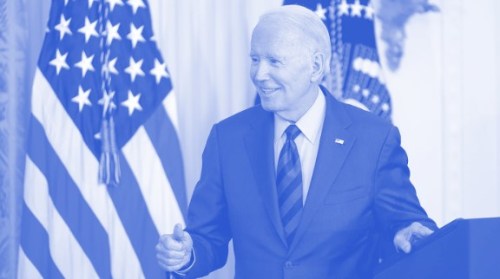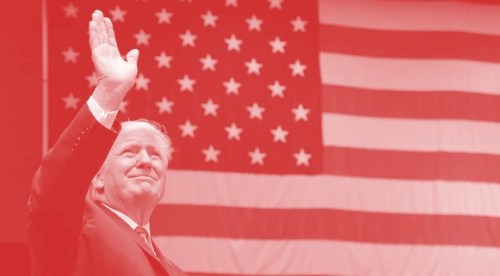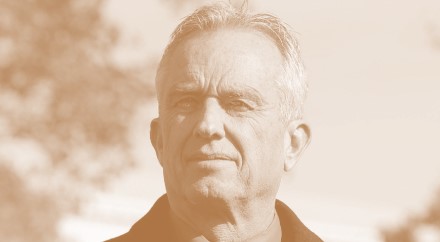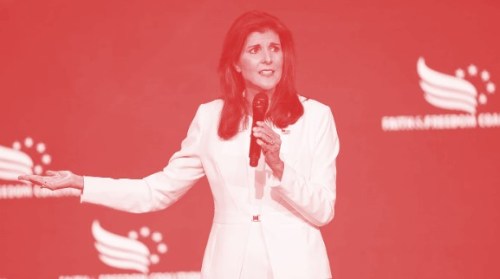5 biggest questions around third-party and independent bids in 2024

Democrats have little patience for Jill Stein, the Green Party candidate who evokes unsettling flashbacks to the 2016 race between Donald Trump and Hillary Clinton — and who dismisses her role as a wrench-thrower eight years ago.
But while Stein, running again in 2024, could send similar stresses through the current presidential cycle, this time she’s not alone. The third party, independent and Democratic primary lane is getting crowded as candidates like Robert F. Kennedy Jr., Cornel West, and Rep. Dean Phillips (D-Minn.) assess if they can rise from being top-ticket wannabes to viable choices for voters.
At this point, no one really knows how they’ll impact the race, causing both Democrats and Republicans to look over their shoulders less than a year out from Election Day.
Here are the 5 biggest third-party and independent questions of 2024:
Which party do they help?
So far, strategists from both parties are already spinning that third-party and independent candidates hurt their opposition and give their own team a boost.
That message is deliberate.
In the absence of much polling to the contrary, it’s plausible that independent candidates like Kennedy could take votes away from Biden (riding the liberal Kennedy name) and bump Trump up — the argument you’ll hear among Republicans. The same case can be reasonably made for progressives Stein and West, who flipped from the Green Party to run as an independent. While their voters may not actually vote for Trump, they could chip enough from the president as protest votes to help the GOP.
But that’s far from a sure bet. In fact, it’s not at all clear that things will break so cleanly along ideological lines. Kennedy, for one, has attracted a lot of Republican donors and has built up a brand that’s closer to the right by attacking the media and adopting some controversial stances around vaccines. Hopeful Democrats say that he has the potential to nab votes from Trump among those who want a less scandal-ridden or just fresher alternative.
“Kennedy of course seems right this moment to be pulling potentially from both,” said O’Brien Murray, a veteran political strategist. “His numbers as an independent are significant.”
For outliers like Stein and West, it’s also possible that they could pull votes away from either side because their strategies hinge largely around bashing the Democratic establishment, with less of a focus on Republicans.
Who will qualify on state ballots?
Several candidates are already mapping out their early state strategies. Phillips, a Democratic congressman running against Biden, is focusing heavily on New Hampshire after the president co-signed a move to change the primary calendar around.
Kennedy has also spent considerable time in the Live Free or Die state, hoping to appeal to non-conformists dubious or disenchanted with establishment politics.
Williamson, meanwhile, was the first candidate to register for the South Carolina primary, where she has publicly and privately expressed a concerted focus. West has touched down in the Midwest, looking to gain an edge with voters during the autoworkers’ strike.
“Generally, third party candidates do not automatically qualify for the ballot, as do the major party nominees,” said Stephen Ansolabehere, a professor of government at Harvard University and an expert on ballot initiatives.
“Third party and independent candidates must gather signatures of registered voters in order to qualify,” he said. “This is costly and time-consuming.”
Will Biden speak up?
If the universe of candidates is spinning things around, Biden is entirely in his own orbit. That is to say, the president is not really even acknowledging that there are forces working against him beyond the Republican primary field.
He now has three primary challengers — including Phillips, whose case for election is a long way away from his third-term seat in the House — adding to the mix of two independents and one Green Party rival.
Biden doesn’t seem bothered. He’s polling at historically low numbers, and voters in the states he needs to win like Pennsylvania and Michigan and Arizona are showing in a handful of surveys that they prefer Trump.
While Biden and administration officials do acknowledge the former Republican president, they’re quiet on the half-dozen other candidates building up their name recognition and campaign coffers while the White House effectively says less is more.
The closest Biden has gotten to addressing his rivals is mentioning No Labels, the group that’s trying to recruit a new consensus presidential candidate. Biden said in an interview with ProPublica last month that “it’s going to help the other guy,” in reference to former Sen. Joe Lieberman (D-Ct.) drawing speculation about whether he would run.
But he has otherwise been quiet about his rivals, who have not held back in criticizing him over his low polls.
Will RFK Jr. coalesce the youth vote?
Kennedy’s sway with young voters, as it appears in polls, has caught some Democrats off guard. In the last Biden vs. Trump matchup, the president captured the majority of the youth vote in part for supporting climate reforms, reproductive freedoms, and promising that issues like student loan debt would be a priority.
While Democrats have seen down-ballot successes consistently post-Roe — as recently as last Tuesday’s elections — it’s clear young voters want more out of the Biden presidency. The reliably Democratic voting bloc has expressed interest in Kennedy in particular in recent weeks, which has the potential to significantly alter the race’s results next fall.
Kennedy received a sizable amount of support among under 45-year-old voters in a poll released by The New York Times/Siena College. The same toss-up states that show voters supporting Trump slightly more than Biden also show Kennedy leading that constituency over the two front-runners. He’s been consistently on the rise, too. An even younger group of voters, between 18 and 34 years old, in a national Quinnipiac University survey also gave Kennedy the edge, in this case 6 points ahead of Biden and 11 points leading Trump, coming in at 38 percent to their respective 32 percent and 27 percent.
“Our biggest swing voter is our base who won’t swing to Donald Trump or a Republican, but they will swing right out to the couch if they don’t think it’s worth their time, nobody’s paid them attention, or they’re being ignored or taken for granted,” Rep. Pramila Jayapal (D-Wash.), the chair of the Congressional Progressive Caucus, told CNN on Monday.
“They won’t vote. And we know what happens when that happens, it’s 2016 all over again,” she said.
What will Joe Manchin do?
Sen. Joe Manchin (D-W.Va.) is getting out of West Virginia — physically and metaphorically, at least for now. He announced recently that he would not run for another term in the U.S. Senate, all but guaranteeing Democrats will lose a seat in the upper chamber to Republicans.
Manchin was among the party’s most vulnerable Democrats and has long garnered speculation that he could retire at the end of this term, as the nation shifts its focus to the 2024 presidential race.
“Manchin, because of what he’s done to Democrats and Democratic issues, will not be able to pull the Democrats most likely, so therefore he could be a terrific conversation about what has to be done and realize he may not be the guy,” said Murray.
The 76-year-old centrist has been quiet about his next act, but it’s no surprise that his retirement decision has caused those in his party to nervously await what he could be planning. If he truly leaves politics, he could cement his legacy as a long-standing moderate who often bucked his party’s popular positions — and went against the sitting president — to stand by voters in his state.
That resistance has consistently put him at odds with progressives on the other wing of his party, who see a hypothetical Manchin presidential run as detrimental.
“Joe Manchin watered down the Democratic economic agenda, made the cost of raising children higher and billionaire taxes lower, and now doesn’t even run for reelection,” said Adam Green, who co-founded the Progressive Campaign Change Committee.
“History, and West Virginians who are struggling, will not judge Joe Manchin well,” Green said in a statement. “Manchin’s record of enriching himself and billionaires while hurting working people would also be a disaster on the presidential stage, alienating voters across the political spectrum.”
Manchin promised to canvas the country to assess whether there’s enough appetite for a centrist choice. Right now, he’s the only one who knows his true motivations.
“Will he turn to his brethren and say here’s what I’ve learned, here’s what we have, what can we do to help? Or will he say, ‘Hey I’ve done what I could, it didn’t work and God bless and somebody else can do it,’” said Murray.
Copyright 2023 Nexstar Media Inc. All rights reserved. This material may not be published, broadcast, rewritten, or redistributed.





